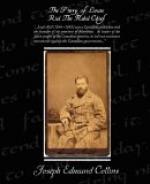Another detachment of the bloodhounds directed their steps towards the residence of Barnez Fremoine, the Belgian rancher. He was a tall, magnificently-built man, and when the savages got in sight of his house they perceived that he was engaged oiling the axle of his waggon.
Aided by the shelter of an outhouse, they approached within twenty yards of this victim; raised their arms and arrows and fired. He fell likewise without uttering a cry, and made no stir. When found afterwards there were two bullet holes in his head, and an arrow lay lodged in his breast. [Footnote: This fact I get from correspondence to the Ottawa Free Press, a newspaper which, under the great journalistic enterprise of Mr. J. T. Hawke, has kept the people at the Capital well informed from day to day on affairs at the scene of tumult.] Two other persons were surprised in the same way, and shot down like dogs, making a total of eleven slaughtered.
The first official confirmation of the dreadful tragedy was given in a despatch, sent from Fort Pitt to Sir John Macdonald, by police inspector Dickens, a son of the immortal novelist.
CHAPTER XIII.
Perhaps, of all the acts of bravery recorded during this late Rebellion, not one stands out more prominently than that of Inspector Dickens, in resisting, with his little force, a large band of blood-thirsty Crees, till he would, with advantage and honour, retire from his ground. Fort Pitt stands in the centre of the Cree country, and was the scene of the treaty between the Government and the Crees, Chippewayans, Assinniboines and the Chippewas. There was great difficulty at the time in concluding the terms of the treaty. Big Bear, who reigns supreme in the district, and who was spokesman at the treaty, maintained that hanging ought to be abolished, and the buffalo protected. On the whole, he accepted the conditions of the treaty, but, as his people were not present, he would not sign it, although he did sign it in the following year. Big Bear is a noisy, meddlesome savage, who is never in his glory save when he is the centre of some disturbance. He has always shown much delight in talking about war; and he would go without his meals to listen to a good story about fighting. He has the habit to, when the reciter of the story has finished, of trying to discount what he has heard, and to make his auditors believe that some exploits of his own have been far more thrilling. When everything is peaceable, even when there are plenty of buffalo and peltry to be had, this savage is not satisfied; but still goes around asking if there is any news about trouble being about to take place anywhere. If he is told:
“No, everything is quiet; the Indians are all satisfied, because they are doing well.” Big Bear will reply, while knowingly closing one eye:




